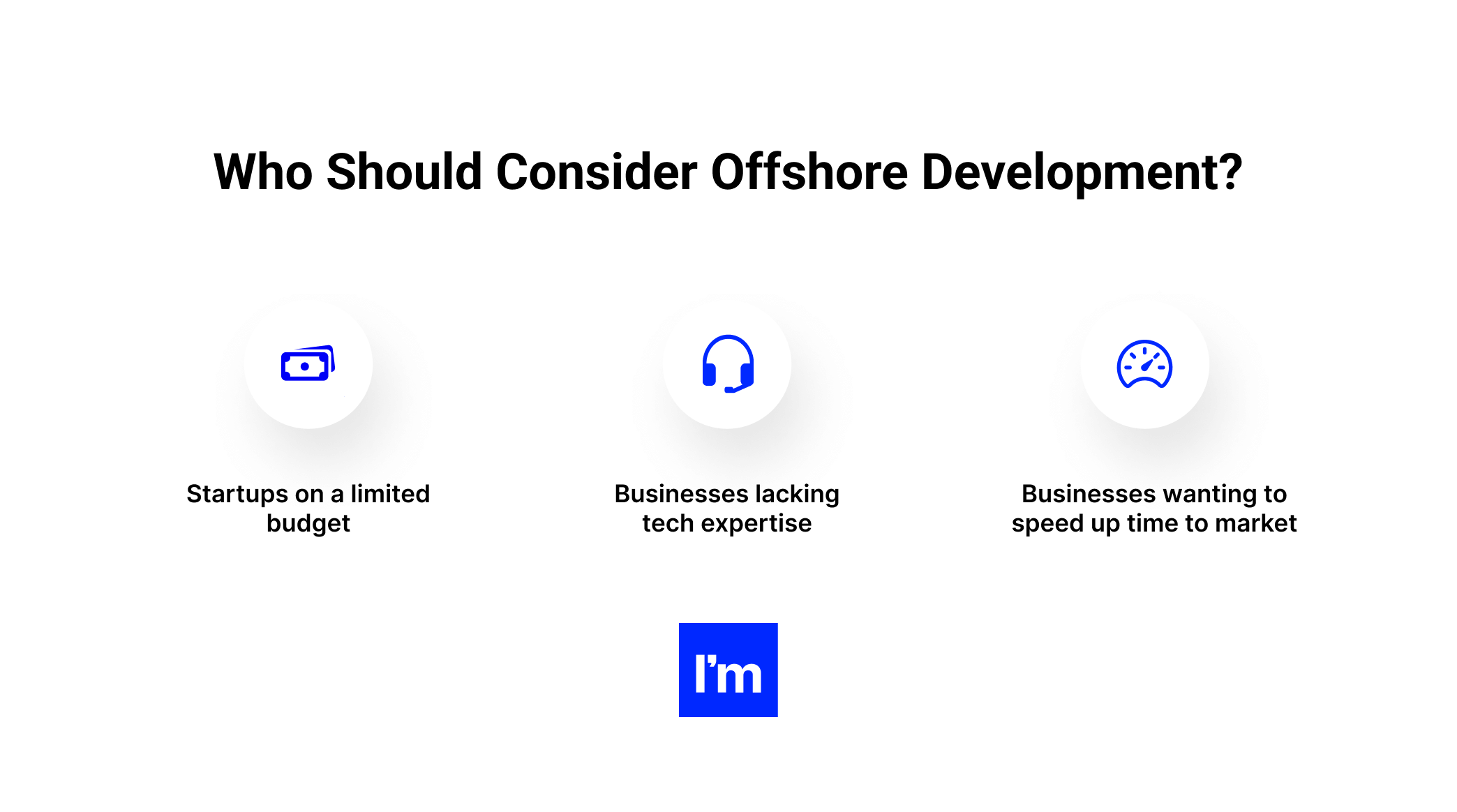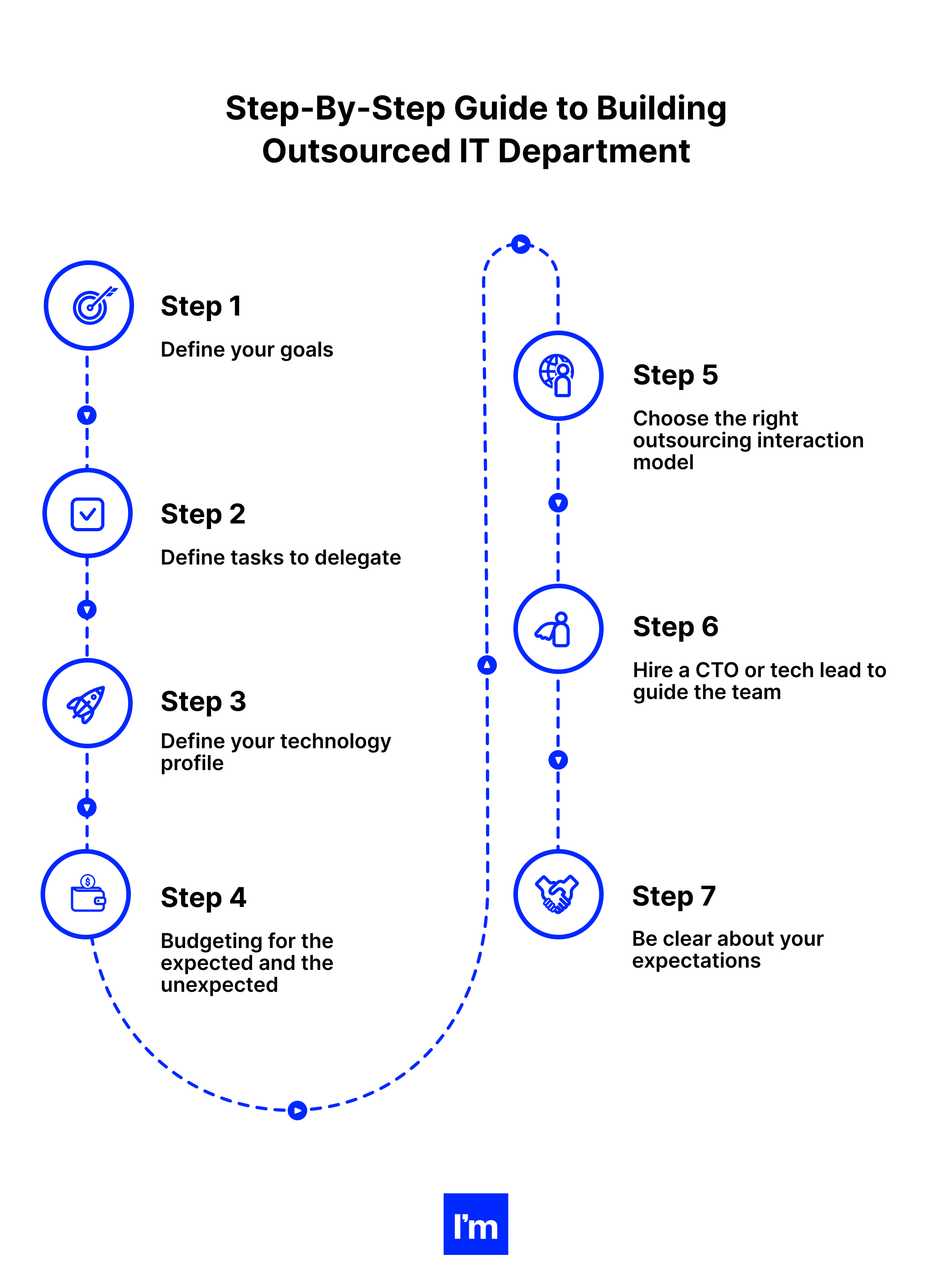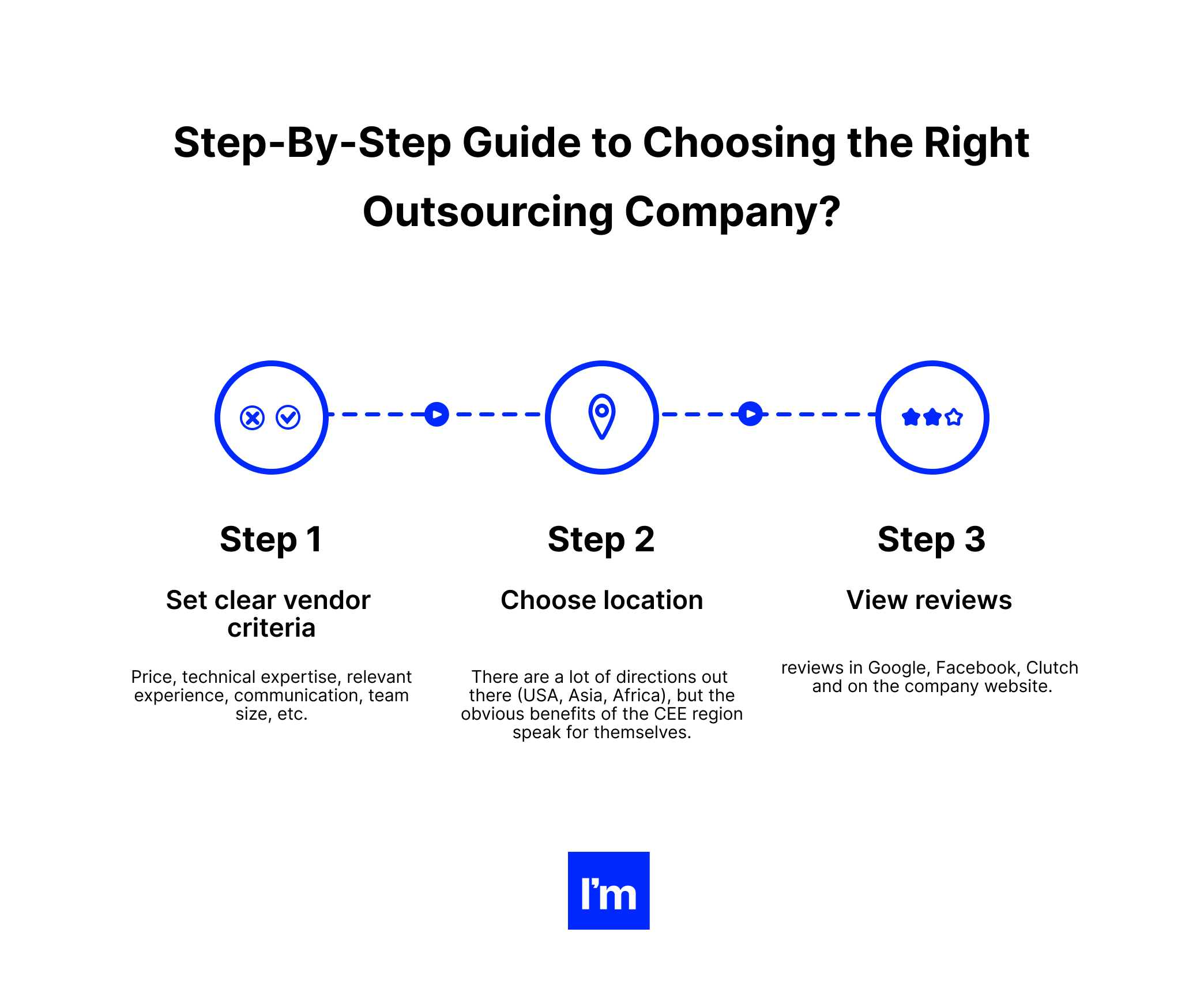Building an outsourced IT department is a common practice these days. Although it is difficult to link the beginning of this business strategy to a specific day, most researchers agree that the birth of IT outsourcing was in the 1980s. Almost forty years have passed since that time, and much has been changed and improved. IT outsourcing as we know it now provides companies with many opportunities and benefits.
Firstly, let’s dig deeper into “what is IT outsourcing?” nowadays - Information technology outsourcing is the practice of finding an external provider to perform various IT functions of an organization.
In 2022, the IT offshoring market size amounted to $66.52 billion.
As our updated IT outsourcing report suggests, this method has many benefits for both small businesses and large enterprises. As an excellent strategic tool, it can offer more than just cost-saving opportunities. Main benefits include:
- Flexibility. Outsourcing helps you quickly and efficiently deal with IT tasks and peak loads. And best of all, you don't have to overpay to hire and then fire a full-time employee. This is especially useful when a company needs a particular skill for a short period of time.
- Wide pool of qualified specialists. Access to a wider pool of skilled experts and scarce resources has become one of the biggest benefits of outsourcing IT services. Sometimes it can be quite difficult to find a full-time employee with a certain set of skills. And it is even more difficult to train these skills. Thus, it makes sense to have an outsourced service provider that can provide you with the resources you need and meet your company's skill and technology needs as required.
- Focus on the core business of your company. The power of your team can be increased through task outsourcing. This is especially important for small and medium-sized companies that do not have a wide range of IT resources. Instead of overburdening employees with tasks they aren't very familiar with, it's best to leave those tasks to the experts, allowing the internal team to focus on core business tasks.
- Cost-effectiveness. One benefit of outsourcing IT services that really stands out is the ability to save money. If we look at Deloitte research, we see that 59% of companies choose to outsource IT services because it helps them cut costs.
- High performance. If the workload is divided into several functional parts, the performance is higher and you get results faster. That's what outsourcing is. You delegate some tasks to external experts, and these tasks are performed simultaneously with your main business tasks.
- Industry knowledge and innovation. No one will argue with the fact that your staff members know your business inside and out. However, sometimes this knowledge hinders the use of innovative approaches when it comes to processes that workers are used to. If your business has nothing to do with information technology, there is a good chance that you are overlooking the latest trends in the industry.
- Quality equipment you don't have to buy. There is no need to spend thousands of dollars on expensive hardware and software that you are likely to need to complete several tasks a year. IT outsourcing companies take care of everything so that you can get the highest quality IT products.
- Management of risks. When you partner with full-cycle IT companies, they are more likely to share the risk of service outages with you, as well as provide disaster recovery and data protection services. It is recommended to include this in the agreement when signing it.

As of today, the next list of services are typically outsourced:
- Application/software development
- Application support or management
- Database development or management
- Datacenter management
- Data storage
- Disaster recovery (DRaaS)
- Email
- Infrastructure – hardware, software, and network installation and support
- Networking and communications
- Security – virus, spam, and other online threat protection
- Technical support or help desk
- Telecommunications
- Web development/hosting
However, be aware that it is not a one-size-fits-all approach. Be sure to weigh all the benefits and challenges before leveraging this method.
The best approach to building outsourced IT department: a step-by-step guide
Increasing productivity, improving product quality, and reducing costs are just some of the benefits that an outsourced IT department can offer. However, you won't be able to successfully outsource IT development without careful planning, so having a solid outsourcing strategy in place is the first step to hiring a vendor to meet your needs. But how to create it? Below are a few things for you to consider.
#1. Define your goals
Cost reduction is a common reason to outsource, but it's not the only good reason to do so - don't limit yourself to finding a supplier solely on price. The use of advanced technologies, streamlined processes, and reduced risk of business expansion are other benefits of outsourcing. Your goals should be realistic, balanced, and achievable.
A company that clearly defines its outsourcing goals early on is already one step ahead of the competition. Firms that carefully define their outsourcing goals, step by step, will be in a better position to choose the right staffing model for their particular industry than companies that pay less attention to these steps because they have taken the time to understand the pros and cons. outsourcing.
Another advantage of clearly defining outsourcing goals is the ability to assess the company's actual outsourcing needs. While there are many positives to staffing, there are also some downsides that may mean that outsourcing may not be the best staffing approach for a particular business for a given period of time. But when a game or software company is gearing up for the next phase of product development or launching several new projects that exceed the capabilities of their current employees or require outside technical or creative expertise, staffing agencies can help the company. with the skilled professionals, she needs.
By setting well-defined outsourcing goals early on, a firm can use IT staff in the most efficient way, possibly increasing productivity while saving money by adding or cutting additional staff depending on the business or budgetary considerations.
#2. Define tasks to delegate
While some companies are known for excellent coding, others offer stellar consulting services. To find the ideal outsourcing solution, it is very important to determine exactly what tasks you want to outsource.
The best solution would be to turn to a vetted tech talent marketplace to find some real talent. Roles best suited for outsourcing are as follows:
- Mobile developers
- Web developers
- Back-end, front-end, and full-stack developers
- Quality assurance engineers
- Tech support specialists
- DevOps engineers
Hint: the amount of IT functions your business needs to outsource will vary depending on your business’s size, budget, expertise, and in-house IT department.
#3. Define your technology profile
Because software development outsourcing is typically done remotely, it's important that your vendor has a technology profile that matches your needs. To this end, we recommend that you make a list of the resources you need for your project. And don't forget the security and data protection features as data leakage is not uncommon.
#4. Budgeting for the expected and the unexpected
While the size of the IT outsourcing market is likely to fluctuate over the next few years due to changes in the global economy, as well as companies cutting costs by moving less critical IT services to cloud computing environments, operating managers still need a budget for the various business scenarios that arise from the growth model.
When developing monthly, quarterly, and annual budgets, companies need to consider their current staffing needs, as well as how increases can help reduce their overall staffing budgets if and when they are implemented properly. But they will also need to budget for contingencies, such as unforeseen staff turnover or a new contract that requires a more skilled workforce than is currently available.
Managers often cite "hidden costs" as one of the main reasons why outsourcing efforts may fall short of initial expectations. A reputable IT firm can help a company validate its additional staffing plan, strike the right balance between availability and expected results, and identify possible hidden costs, giving the client the ability to quickly scale up or downsize additional staff when needed or at short notice. notice without breaking the bank.
#5. Choose the right outsourcing interaction model
When planning to outsource your IT department, HR leaders should prioritize the specialized skills they are looking for and explain why. By clearly defining the technical or creative expertise they need to add, it becomes easier for management teams to select an outsourcing engagement model that fits their specific workforce requirements.
There are many outsourcing models to choose from, including on-site, nearshore, and offshore engagement models, each with different benefits and risks.
By choosing the right outsourcing recruitment model—in consultation with an experienced technical staffing firm—from the outset, businesses can bring additional staff to the job as quickly and efficiently as possible, without wasting time or resources or reducing productivity by any significant amount. time.
#6. Hire a CTO or tech lead to guide the team (then snowball into other seniority levels)
Companies that do not have a detailed list of functions or processes to be outsourced may seek the help of an external consultant. A tech lead can help to study internal practices and translate them into commercial commitments for the selected outsourcing provider. They may also be involved in vendor selection and outsourcing deals, but be careful to articulate the hired CTO's role early in the process.
Such guys would greatly help you reduce the risks of outsourcing.
Indeed, while outsourcing has many benefits, it also comes with some risks that need to be considered. By hiring the one who can understand and mitigate these risks, companies can reduce their financial issues while increasing the efficiency of their chosen outsourcing model.
Here are four risks to pay particular attention to:
Trust and control
Management oversight is reduced when a company outsources, especially when choosing an onshore, Nearshore, or offshore model. HR directors can gain credibility by learning as much as they can about the IT firm they work with, talking to previous clients, and making sure they are happy with their vendor's outsourcing methodologies. These simple steps can help establish clear communication protocols, building a sense of collaboration and trust between a company and its supplier.
Quality problems
In addition to reducing or losing operational control or oversight, outsourcing can also carry risks of quality problems. These risks can be mitigated by working with suppliers who have demonstrated a commitment to quality control with past clients and projects and have an end-to-end process for quickly resolving any quality issues – onsite or offsite – with a creative or development project (using extended staff) in case of problems with the quality of products or services.
Legal problems
One more issue that can be easily solved by a seasoned manager is legal problems. Tax implications, intellectual property ownership, treatment of employees, pension obligations, and regulatory compliance are just some of the legal issues that may arise in an outsourcing transaction. Financial institutions that are considering outsourcing, for example, will need to comply with instructions from the Office of the Superintendent of Financial Institutions (OSFI). Legal issues should be explored early on as their resolution may affect your company's ability to achieve its outsourcing goals.
#7. Be clear about your expectations
Effective communication both inside and outside the company is essential for successful outsourcing. All stakeholders should be on the same page regarding the work and results of the contract. When you clearly communicate to third parties what you expect from the outsourcing industry, they may even help you improve your operations. This is because they are experts in providing services.
They know the nature of such contracts and their viability. Hence, they can give good advice on legal, political, technological, and other issues. At the same time, it is important for you to take care of the people working within the company.
The decision to outsource your IT project development is huge and has a big impact on the entire company, its people, and operations. Employees may become insecure about their positions. Therefore, in order to avoid the spread of unnecessary rumors that can tarnish the company's reputation, it is best to openly communicate with people and inform them of the company's decision.

To supplement your thoughts please check out the next material - IT Outsourcing For Product Owners vs For CEOs!
How to choose the right outsourcing company?
There are thousands of IT vendors around the world. Most of them have a rich portfolio, excellent customer reviews, and extensive experience in software development. Therefore, choosing an IT partner is never easy. To make your journey easier, we have created this step-by-step guide to choosing the right offshore IT company.
#1. Set clear vendor criteria
The selection of a remote developers’ supplier is always based on certain criteria. It is hardly possible to find an IT outsourcing company that would fully meet all of them. Therefore, before rushing into research and selection, you should clearly understand which aspects are critical for your case. Do you need to save money? Are you lacking technical knowledge? Do you need to scale your development process?
We have compiled a list of the most common factors influencing the choice.
- Price. Cost-effectiveness is one of the main reasons to outsource information technology, so choose an offshore development company within your budget.
- Technical expertise. If you want to expand your capabilities and need developers with certain experience and skills, this should be one of the selection criteria.
- Relevant experience. When choosing an outsourcing company, look for examples of such cooperation in the vendor's portfolio, paying special attention to the technology stack, the size of the client's organization, and the duration of the project.
- Communication. Pay attention to how the company communicates, how long it takes them to respond to your requests, how involved they are. Good English is also required for effective cooperation with an offshore outsourcing company. Another important aspect that affects communication is a cultural fit, so keep that in mind as well.
- Team size. You can't expect a company of 15-20 people to deliver enterprise-grade solutions successfully. In addition, the provider must have enough capabilities in case you need to scale quickly.
These criteria may vary depending on the needs of the business, so you can add the ones that suit your situation.
#2. Choose location
If you need help choosing a location to set up an outsourced IT department, here is a resource you can use - Poland as the Leading Software Outsourcing Market in CEE.
Other ones include:
Each direction has its own advantages and disadvantages, but some of them have already established themselves as reliable partners. For example, the presence in the European Union and a significant improvement in the business climate are forcing more and more companies to choose Poland for IT outsourcing.
#3. View reviews and reviews in Google, Facebook, and on the company website
You can always ask for customer references during the interaction, but you can check customer reviews even before contacting vendors. Review recommendations on social media and Google. Also, check out the customer reviews on the site. Many companies also provide video testimonials so you can see real people describing their collaboration with that company.
Employee feedback is also important, as a company's brand image affects its recruitment capabilities. If there are a lot of negative reviews about a vendor on social networks, then it also has a bad dropout rate. So don't forget to look at employee reviews.

Recap
So, in the end, let's ask the question again. Is hiring offshore developers a good idea?
It is hard to argue with the fact that outsourcing is a powerful tool in the IT field, especially in the post COVID times. Believe it or not, in most cases it's a good idea to outsource IT tasks and features to someone who can do them better, faster, and cheaper.
However, IT outsourcing is not only rainbows and sunshine. This strategy has several drawbacks that can get in the way. We strongly recommend that you weigh the pros and cons of outsourcing before choosing it. But, you should not treat the possible risks associated with an outsourced IT department as something you cannot avoid.
With the right approach to hiring an outsourcing company and drawing up a contract, the risks will be minimal.
Get our webinar recording and presentation to learn more about the ins and outs of IT outsourcing.







.png)
.png)



